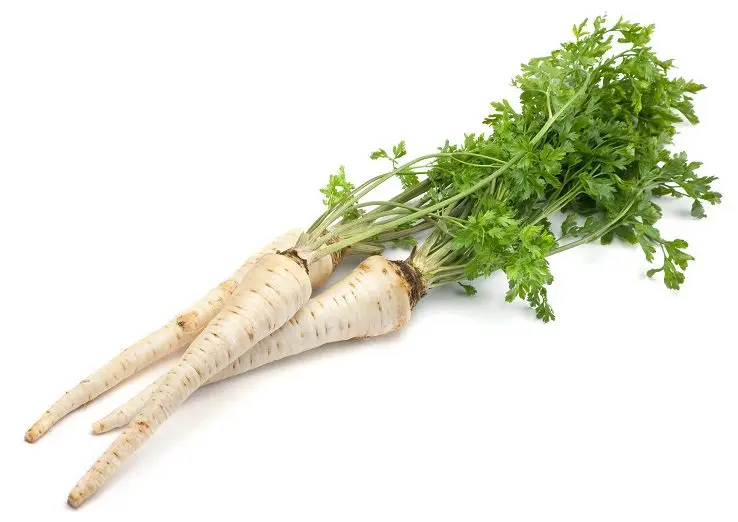Parsley (Petroselinum crispum) is a perennial herb in the Apiaceae family. The culture has been well known since antiquity for its aromatic properties, and due to its ease of cultivation, it quickly spread from the Mediterranean countries throughout Europe. The ancient Romans were the first to use the plant for medicinal purposes – greens were used to hide the smell of wine and improve digestion. In the Middle Ages, parsley tincture was used to combat asthma, dropsy, jaundice, and even plague.
Useful properties of parsley
The roots, leaves and seeds of the plant contain many useful substances. Main components:
- amino acid lysine;
- essential oil rich in apiol and furocoumarins;
- flavonoid rutin;
- vitamins A, C and group B;
- calcium, phosphorus, iron, zinc and potassium;
- alkaloid myristicin.
Due to the rich vitamin and mineral composition, the infusion of the leaves is used for circulatory diseases and helps to restore hemoglobin in anemia. A decoction of the roots is effective in diseases of the genitourinary system, promotes the removal of excess fluid, and prevents the appearance of edema. Parsley increases estrogen levels and eases the symptoms of premenstrual syndrome.
Essential oils normalize digestion, relieve flatulence and intestinal colic. Apiol and myristicin are strong antispasmodics, so they help with pain of various origins. Grass helps to increase appetite, so it is used for anorexia. A large amount of vitamin C makes parsley a good tool for strengthening immunity and preventing colds.
The leaves and roots of the plant are traditionally used fresh or dried, but decoctions from them are not stored for a long time, and frozen greens lose some of their valuable properties. Alcohol is a good solvent, therefore, upon contact with raw materials, it extracts a maximum of useful components from the plant. Properly prepared parsley tincture on vodka is effective in the treatment of a number of diseases and can be used throughout the year.

Parsley leaf tincture
Greens are harvested throughout the season. The stems are cut, washed, crushed and dried in a ventilated area, closed from direct sunlight. Parsley infusion is prepared at the rate of 1-2 tbsp. tablespoons of fresh or dried stems and leaves in a glass of hot water. The grass is poured with boiling water, wrapped, insisted for 20-30 minutes and taken for various diseases according to the scheme:
- flatulence and indigestion – 100 ml of infusion half an hour before meals;
- diseases of the urinary system – a glass of infusion in the morning for a month;
- painful menstruation – 1 tbsp. l. infusion 3 times a day for three weeks;
- stomatitis and gingivitis – rinse 2 times a day after brushing your teeth.
Alcohol tincture of parsley leaves is prepared as follows:
- put chopped and dried greens tightly in clean jars;
- fill to the top with vodka or diluted alcohol;
- place in a dark, cool place for 3 weeks, periodically shake the jars;
- Strain the resulting tincture, store in the refrigerator.
The remedy is used to prevent colds by a teaspoon once a day after meals for three weeks. With cuts and bruises, the solution contributes to the rapid healing of wounds and the removal of edema. In cosmetology, tincture is used to combat oily skin, treat acne, and whiten the face.
Parsley root tincture
Raw materials are harvested in the autumn, when the plant has already faded and the root system is well formed. The roots must be properly washed and peeled.
Recipe tinctures:
- Grind 150 g of root and pour 0,5 l of vodka;
- insist three weeks in a dark place, shaking the container daily;
- when ready, strain and pour into another bowl.
Tincture is taken for diseases:
- hypertension – 1 tsp. twice a day before meals until the condition improves;
- prostatitis, circulatory disorders of the small pelvis – 15 ml on an empty stomach in half a glass of water, the course of treatment is 14 days;
- joint pain with arthritis – in compresses and rubbing.
Противопоказания
The diuretic properties of parsley can be harmful for nephritis and kidney stones. Extracts of medicinal plants on alcohol are forbidden to use with pancreatitis. The tincture can cause uterine contractions, so it is absolutely contraindicated in pregnancy. Before taking a home-prepared drug, it is imperative to test it for possible allergies.
Attention! Self-medication can be dangerous, consult your doctor.









